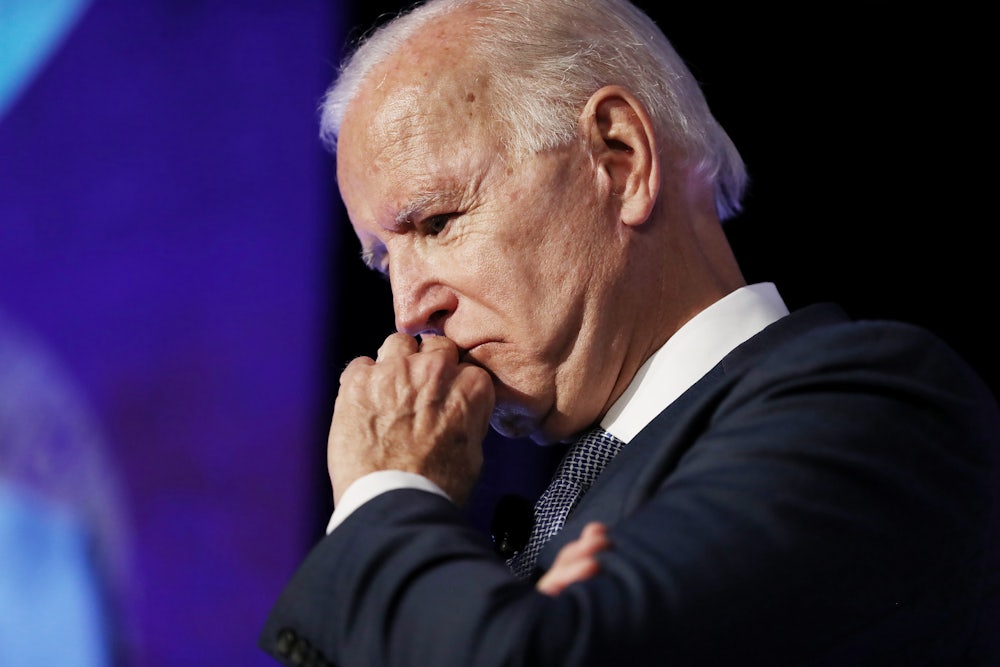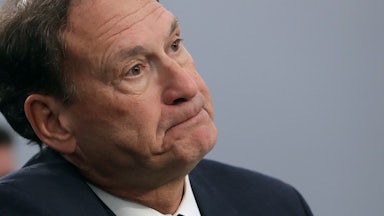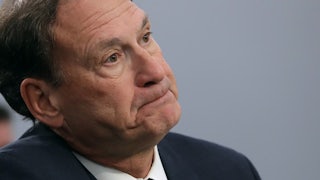Joe Biden and the Democrats are feeling very sorry for themselves. It is surprising that it took this long to reach this stage: Biden’s approval rating has been underwater since mid-August, when the botched withdrawal from Afghanistan precipitated a rapid sea change in public opinion. Since then, he has been mired in what can only be described as the Trump zone: stubbornly popular with 40 percent of the electorate, stubbornly unpopular with everyone else.
On Tuesday, NBC News reported on the president’s frustrations, noting that “Biden is rattled by his sinking approval ratings and is looking to regain voters’ confidence that he can provide the sure-handed leadership he promised during the campaign.” He has also, according to these reports, become frustrated with the messaging surrounding his leadership on the economy and in foreign policy. There is, throughout, a sense that inertia has overtaken the administration. Per NBC News:
Crises have piled up in ways that have at times made the Biden White House look flat-footed: record inflation, high gas prices, a rise in Covid case numbers—and now a Texas school massacre that is one more horrific reminder that he has been unable to get Congress to pass legislation to curb gun violence. Democratic leaders are at a loss about how he can revive his prospects by November, when midterm elections may cost his party control of Congress.
“I don’t know what’s required here,” said Rep. James Clyburn, D-S.C., whose endorsement in the 2020 Democratic primaries helped rescue Biden’s struggling candidacy. “But I do know the poll numbers have been stuck where they are for far too long.”
There is a familiar gripe at the center of all of this ennui: that Democrats are actually getting things done, they just aren’t calibrating their messaging in a way that gets through to voters. This is typically aired over conversations about the economy: Democratic administrations, the data clearly shows, are better at managing the economy than Republican ones are—and yet voters still believe that the GOP is better for their pocketbook. And so the solution to this problem is obvious: more and better messaging, as quickly as possible.
There’s no doubt that Democrats are seeing a perplexing disconnect with the public: In one particularly daunting example, the onetime recipients of the now-expired expanded child tax credit have, according to polls, moved from supporting the Democrats to supporting Republicans—all despite the fact that no member of the GOP supported the expansion of the credit. But the carping over how the people are failing to truly see the distinction between the parties only underscores the self-pitying tone of the administration and its leader at the moment. “Amid a rolling series of calamities, Biden’s feeling lately is that he just can’t catch a break,” NBC reported. “Biden is frustrated. If it’s not one thing, it’s another,” a person “close to the president” told the network.
There is, throughout these reports, a sense from the administration’s allies that Biden isn’t getting a fair shake—that so many crises have occurred in such quick succession since the withdrawal from Afghanistan that the administration hasn’t received ample credit for its efforts to mitigate them. This is another familiar Democratic complaint: that the party’s leaders are buried beneath an avalanche of bad news, to the point that they are not given fair credit for their successes.
There is some truth to this. Democratic administrations have consistently delivered better economic results than Republican ones—and yet voters consistently believe the opposite. But Democrats have, despite producing better economic results, failed to deliver—for instance—answers to pressing problems like persistent inequality, despite running better economies. And even when they have—as happened recently with the child tax credit—these popular, successful problems are allowed to expire without a political fight being waged. One reason the child tax credit’s beneficiaries have shifted to backing the GOP may simply be that Republicans were never tarred as the “bad guys” in a larger fight over a popular policy. In general, as the Democrats struggled with policymaking over the back half of the previous year, when they failed to enact the cornerstone of Biden’s agenda, they looked more like a party that couldn’t agree with itself long enough to deliver the goods—not like a party battling the GOP’s inferior political vision.
There are signs that the administration is making more of an effort on the messaging front. Politico Playbook led on Tuesday with a story about the administration’s “pivot to the economy.” Biden himself wrote an op-ed on Tuesday in The Wall Street Journal emphasizing his plan to fight inflation: letting the Federal Reserve do its work without political pressure; fixing the supply chain; reducing costs on housing, medicine, and childcare; and reducing the deficit. The outlet and the plan made it clear that Biden was courting the “reasonable Republicans” he has long coveted.
This is a double-edged type of messaging, however. It’s certainly clear that most voters aren’t sure what the administration is doing to fight inflation—Biden’s op-ed at least signals that he’ll be making the issue more of his focus in the months ahead. But it also draws attention to the fact that the administration only now seems to be turning to issues that have been going on for months. It’s also not clear that merely handing some Politico reporters a scoop about your pivot and publishing a single op-ed in The Wall Street Journal truly counts as messaging. How many voters will learn of these plans from a couple of elite media institutions?
Still, it’s a step in the right direction, albeit one born of the same inertia that has so frustrated Biden and other Democrats. The party hoped that it could run on the Build Back Better Act. This has been stuck in Congress for months and shows little sign of getting unstuck anytime soon. The party has spent much of 2022 focused on other understandable crises—first the war in Ukraine and now an outbreak of horrific gun violence—but it has yet to find much progress in any domestic arena. Still, wallowing to the Beltway media about how rough it is to do politics isn’t going to help anyone. There’s still time to confront inflation and lower costs for consumers—but it will take deeds, not words, to truly give Democrats something to run on when voters go to the polls in five months.










